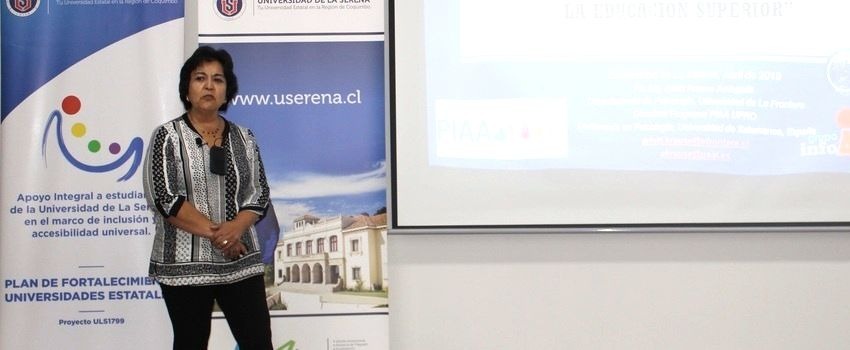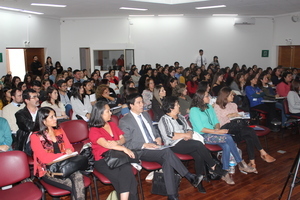- News
Mg. Arlett Krause: “As a country we have made progress on inclusion issues, but there are still missing guaranteed rights”

This was stated by the academic from the School of Psychology of the University of La Frontera in the context of her talk “Pedagogical strategies: Autism spectrum disorder”, which she gave at the University of La Serena.
With the firm conviction that more and more progress can be made in terms of inclusion, the prominent professional in the area, Mg Arlett Krause, an academic at the UFRO and current doctoral student at the University of Salamanca, Spain, spoke with professors from the Coquimbo Region in the meeting organized by the ULS Office of Inclusion and Disability called “Pedagogical strategies for diversity: Autism Spectrum Disorder and motor disability”, within the framework of the ULS1799 project.
 At the activity, which was attended by academics in the area and professionals who are experts in integration and inclusion, Krause stated that although “Chile has made progress in inclusion issues, there are still no guaranteed rights.”
At the activity, which was attended by academics in the area and professionals who are experts in integration and inclusion, Krause stated that although “Chile has made progress in inclusion issues, there are still no guaranteed rights.”
In conversation with this medium, the expert analyzed the way in which education can be an active entity of significant changes, not only starting from the basis of the integration model, but also allowing practice to strengthen what this concept really means.
“I think there are many challenges. Universities have a job of training professionals and in that the frameworks must be updated, or is it conceivable in a globalized society of the future that students do not have inclusion content, I believe that is a duty of universities. On the other hand, universities, especially state universities, have a public role and that is to work with the communities and contexts of the territories, and I think that in this regard, the universities are just learning to do so and, without a doubt, it is an contribution to social changes, since they can not only be done discursively, but also in practical training and I believe that universities are addressing the issue there.”
In addition, the academic from the UFRO School of Psychology highlighted the work that the University of La Serena is doing, creating participatory workshops with entities involved in complex scenarios, where inclusion is lived day by day, but where, without a doubt, the path is long.
He also thanked the institution for the invitation he received, and highlighted the way in which the ULS has been taking active participation in different inclusion activities, showing that this “is no longer someone else's issue, but rather our own, where we must take part to deliver solutions.”
Written by Patricia Castro, DIDEC
